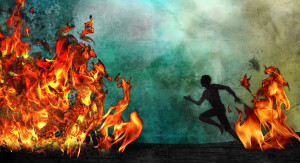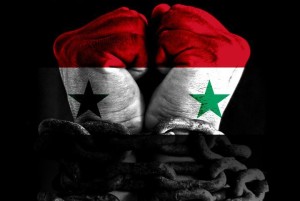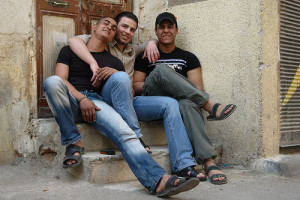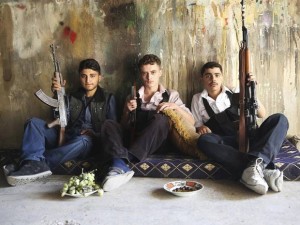If caught by jihadis, Syrian gays may be thrown from rooftops, or ransomed. And many live in fear of their own families. But Lebanon’s not the safe haven they hoped.
Reporting from Beirut by Amelie Zaccour
 Two young men we’ll call Karim and Tareq were walking through the streets of Raqqa, Syria, in September 2013 on their second date. They’d just been to a good restaurant, and Karim was excited as Tareq was about to introduce him to his friends. But the night quickly turned ugly when five strangers showed up, put a sack over Karim’s head, gagged him, and drove him to an unknown location. Nobody touched Tareq, and later, from his cell, Karim heard his captors and Tareq talk about ransoming him to his family.
Two young men we’ll call Karim and Tareq were walking through the streets of Raqqa, Syria, in September 2013 on their second date. They’d just been to a good restaurant, and Karim was excited as Tareq was about to introduce him to his friends. But the night quickly turned ugly when five strangers showed up, put a sack over Karim’s head, gagged him, and drove him to an unknown location. Nobody touched Tareq, and later, from his cell, Karim heard his captors and Tareq talk about ransoming him to his family.
Tareq had been posing as a gay man but working with a group linked to Jabhat al Nusra, according to Karim, in order to entrap homosexuals, a not uncommon practice in war-torn Syria. Al Nusra, the anti-Assad militia most closely associated with al Qaeda, had picked up one of Karim’s friends and got a list of numbers from his phone to track down other gay people.
While Karim was being held, his captors kept shouting, “Are you with the regime?” And he kept telling them, “No.” They asked if that was the last thing he had to say and threatened him with a sword. Karim demanded to know the real reason behind his imminent execution. Finally, there it was: “Because you are gay,” they answered.
After two weeks of negotiations with Karim’s family and a ransom payment, he was released and he has since come to Lebanon, thankful he’s still alive. Many have not been so lucky.
Sometimes, Jabhat al Nusra and the rival extremists of the so-called Islamic State (ISIS) are simply in search of cash, as was the case of Karim. He said ISIS demands ransom of up to $11,000. But a recent video that went viral on social media showed ISIS throwing gays from the roof of a building in Raqqa. “Before [the war], if the [Assad] regime caught you as a gay, you would give them money and they’d leave you alone,” says Karim. “Today, if jihadis catch you, they kill you.”
Until his arrest, only Karim’s nuclear family knew about his homosexuality, which they kept secret to preserve their reputation. But rumors of his detention spread quickly, and many people in Raqqa became aware that he was gay.
Then, in December 2013, one of Karim’s relatives became an important member of ISIS’s intelligence apparatus. One day, as Karim came back to his house, he found the whole place turned upside down. “ISIS is looking for you,” said the doorman. Karim hid at his neighbor’s until his uncle picked him up and informed him that, in exchange for money, he managed to have Karim’s name removed from ISIS’s checkpoint lists for two hours. “You have to leave Raqqa right now,” said the uncle.
Karim gathered his belongings and left Raqqa. “I felt like it was a bad dream, that the next week everything would go back to normal and I’d return home.” But instead, Karim fled to Damascus and finally settled in Beirut in March 2014.
His friend, whom we’ll call Mazen, joined Karim a few months later. Mazen asks to be called “Jenny” and be referred to as a “she.” This 29-year-old transgender fled Mayadin, a city close to Deir Ez-Zor, in Syria’s eastern provinces, in October 2014. Her uncle, a member of an ISIS sharia court, was given permission, because of his high status, to arrest her himself on charges of homosexual relations. The uncle’s “extremism grew stronger after my boyfriend, who was captured by ISIS, confessed our relationship,” says Jenny.
Jenny denied the relationship until her father and her uncle informed her that she would have to swear on the Quran and go through an anal test, a medical exam to see if it had been penetrated.
At that point, Jenny decided to tell her father that she had been raped. But when he heard the word “rape,” Jenny’s father started beating her with such fury that he fainted. As her uncle took her father to the hospital, Jenny decided the moment to escape had come. “Sometimes, life or death are a matter of 10 minutes,” she said. She arrived in Damascus and called Karim, who welcomed her in Beirut.
Jenny thought she would find peace in Lebanon, but the Lebanese have rejected her due to her effeminate looks and body language, which might be tolerated in a native son or daughter, but not in a refugee. Once, in a shared taxi, in the trendy neighborhood of Badaro, a woman started blowing her cigarette’s smoke on Jenny and hit her with her purse, calling her a “Syrian sissy.” Jenny asked for help from the driver, who merely said, “Madam, please stop fighting.” When Jenny asked him to stop so she could escape, he faked that he didn’t hear her and kept driving.
“Lebanon is known as this modern Western-lifestyle-in-the-Arab-world country, so we thought we could live a normal life and be respected here,” says Karim. “But we were shocked to find out how racist and close-minded people are.” Karim also was beaten and had his nose broken by a group of men in Achrafieh, an upscale, predominantly Christian area of Beirut. He d escribes this type of violence and humiliation as “daily routine.”
escribes this type of violence and humiliation as “daily routine.”
”As Syrians and gays, they are double refugees,” says Bertho Makso from Proud Lebanon, an NGO helping mostly Syrian LGBT refugees. Resentment against Syrians, initially due to the regime’s 30-year occupation of Lebanon, has grown with the refugee crisis and the fallout from the Syrian war. And to Makso, gay rights in Lebanon are “a mirage.”
Despite relative tolerance from the authorities, who turn a blind eye to gay bars and clubs, his NGO reported numerous cases of arbitrary detention and “anal tests”—which the Lebanese Doctors Syndicate denounced as a form of torture. Lebanese law on gays is stated in Article 534, which prohibits having sexual relations that “contradict the laws of nature.” Makso says that this “vague” text leaves matters open to interpretation, and thus enables authorities to persecute gays.
“Yes, you can be gay in Beirut, but as long as you don’t make it public,” says Makso. “And you should know that everything can fall apart at any time.” For instance, Proud Lebanon is registered as a human rights organization, not as a gay rights one. They organize workshops, and provide legal, psychological and medical assistance—including HIV testing—at their headquarters, but cannot organize public events, such as a gay parade.
For Syrian gay refugees, Lebanon is only a transit point to Europe, North America, or Australia, where they can live their homosexuality without fear of arrest or, for that matter, of being tracked down by their families. UNHCR considers LGBT persons to be an “extremely vulnerable population” because, unlike other categories of refugees persecuted on ethnic or religious ground, they also fear persecution from their own communities, and sometimes even close family members.
Indeed, Proud Lebanon has reported several cases of Syrian families who came to Beirut to track down their gay relatives. Jenny’s uncle vowed to find her even if she “moved to the moon.” Karim likewise kept receiving threats a long time after moving to Beirut, including a message from his cousin in Raqqa, saying that he will “cut [his] head in such a way that [he] will beg him to finish as fast as possible.”
Proud Lebanon has, since 2013, counted 216 LGBT Syrian refugees who have registered with the UNHCR; 60 of them have been resettled abroad so far. Along with many others, Karim and Jenny are waiting for what they call “the golden call,” news their visas in Europe or the United States have been accepted.
Story from Daily Beast:
http://www.thedailybeast.com/articles/2015/03/30/gay-refugees-from-isis.html
















